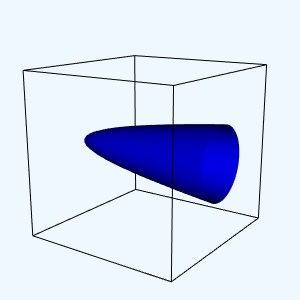DisplayQuadricSurfaces
Repository source: DisplayQuadricSurfaces
Description¶
This example demonstrates how to create and display a quadratic surface.
Other languages
See (Cxx)
Question
If you have a question about this example, please use the VTK Discourse Forum
Code¶
DisplayQuadricSurfaces.py
#!/usr/bin/python
# noinspection PyUnresolvedReferences
import vtkmodules.vtkInteractionStyle
# noinspection PyUnresolvedReferences
import vtkmodules.vtkRenderingOpenGL2
from vtkmodules.vtkCommonColor import vtkNamedColors
from vtkmodules.vtkCommonDataModel import vtkQuadric
from vtkmodules.vtkFiltersCore import vtkContourFilter
from vtkmodules.vtkFiltersModeling import vtkOutlineFilter
from vtkmodules.vtkImagingHybrid import vtkSampleFunction
from vtkmodules.vtkRenderingCore import (
vtkActor,
vtkPolyDataMapper,
vtkRenderWindow,
vtkRenderWindowInteractor,
vtkRenderer
)
def Sphere():
# create the quadric function definition
quadric = vtkQuadric()
quadric.SetCoefficients(1, 1, 1, 0, 0, 0, 0, 0, 0, 0)
# F(x,y,z) = a0*x^2 + a1*y^2 + a2*z^2 + a3*x*y + a4*y*z + a5*x*z + a6*x + a7*y + a8*z + a9
# F(x,y,z) = 1*x^2 + 1*y^2 + 1*z^2
PlotFunction(quadric, 1.0)
def EllipticParaboloid():
# create the quadric function definition
quadric = vtkQuadric()
quadric.SetCoefficients(1, 1, 0, 0, 0, 0, 0, 0, -1, 0)
# F(x,y,z) = a0*x^2 + a1*y^2 + a2*z^2 + a3*x*y + a4*y*z + a5*x*z + a6*x + a7*y + a8*z + a9
# F(x,y,z) = 1*x^2 + 1*y^2
PlotFunction(quadric, 10.0)
def HyperbolicParaboloid():
# create the quadric function definition
quadric = vtkQuadric()
quadric.SetCoefficients(1, -1, 0, 0, 0, 0, 0, 0, 0, 0)
# F(x,y,z) = a0*x^2 + a1*y^2 + a2*z^2 + a3*x*y + a4*y*z + a5*x*z + a6*x + a7*y + a8*z + a9
# F(x,y,z) = 1*x^2 - 1*y^2
PlotFunction(quadric, 10.0)
def Cylinder():
# create the quadric function definition
quadric = vtkQuadric()
quadric.SetCoefficients(1, 1, 0, 0, 0, 0, 0, 0, 0, 0)
# F(x,y,z) = a0*x^2 + a1*y^2 + a2*z^2 + a3*x*y + a4*y*z + a5*x*z + a6*x + a7*y + a8*z + a9
# F(x,y,z) = 1*x^2 + 1*y^2
PlotFunction(quadric, 1.0)
def HyperboloidOneSheet():
# create the quadric function definition
quadric = vtkQuadric()
quadric.SetCoefficients(1, 1, -1, 0, 0, 0, 0, 0, 0, 0)
# F(x,y,z) = a0*x^2 + a1*y^2 + a2*z^2 + a3*x*y + a4*y*z + a5*x*z + a6*x + a7*y + a8*z + a9
# F(x,y,z) = 1*x^2 + 1*y^2
PlotFunction(quadric, 1.0)
def HyperboloidTwoSheets():
# create the quadric function definition
quadric = vtkQuadric()
quadric.SetCoefficients(1, 1, -1, 0, 0, 0, 0, 0, 0, 0)
# F(x,y,z) = a0*x^2 + a1*y^2 + a2*z^2 + a3*x*y + a4*y*z + a5*x*z + a6*x + a7*y + a8*z + a9
# F(x,y,z) = 1*x^2 + 1*y^2
PlotFunction(quadric, -1.0)
def Ellipsoid():
# create the quadric function definition
quadric = vtkQuadric()
quadric.SetCoefficients(1, 1, 2, 0, 0, 0, 0, 0, 0, 0)
# F(x,y,z) = a0*x^2 + a1*y^2 + a2*z^2 + a3*x*y + a4*y*z + a5*x*z + a6*x + a7*y + a8*z + a9
# F(x,y,z) = 1*x^2 + 1*y^2 + 1*z^2
PlotFunction(quadric, 1.0)
def Cone():
# create the quadric function definition
quadric = vtkQuadric()
quadric.SetCoefficients(1, 1, -1, 0, 0, 0, 0, 0, 0, 0)
# F(x,y,z) = a0*x^2 + a1*y^2 + a2*z^2 + a3*x*y + a4*y*z + a5*x*z + a6*x + a7*y + a8*z + a9
# F(x,y,z) = 1*x^2 + 1*y^2 - 1*z^2
PlotFunction(quadric, 0.0)
def Other():
# create the quadric function definition
quadric = vtkQuadric()
quadric.SetCoefficients(.5, 1, .2, 0, .1, 0, 0, .2, 0, 0)
# F(x,y,z) = a0*x^2 + a1*y^2 + a2*z^2 + a3*x*y + a4*y*z + a5*x*z + a6*x + a7*y + a8*z + a9
# F(x,y,z) = 0.5*x^2 + 1*y^2 + 0.2*z^2 + 0*x*y + 0.1*y*z + 0*x*z + 0*x + 0.2*y + 0*z + 0
PlotFunction(quadric, 1.0)
def PlotFunction(quadric, value):
colors = vtkNamedColors()
# sample the quadric function
sample = vtkSampleFunction()
sample.SetSampleDimensions(50, 50, 50)
sample.SetImplicitFunction(quadric)
# double xmin = 0, xmax=1, ymin=0, ymax=1, zmin=0, zmax=1
bounds = [-10, 11, -10, 10, -10, 10]
sample.SetModelBounds(bounds)
# create the 0 isosurface
contours = vtkContourFilter()
contours.SetInputConnection(sample.GetOutputPort())
contours.GenerateValues(1, value, value)
# map the contours to graphical primitives
contourMapper = vtkPolyDataMapper()
contourMapper.SetInputConnection(contours.GetOutputPort())
contourMapper.SetScalarRange(0.0, 1.2)
# create an actor for the contours
contourActor = vtkActor()
contourActor.SetMapper(contourMapper)
# -- create a box around the function to indicate the sampling volume --
# create outline
outline = vtkOutlineFilter()
outline.SetInputConnection(sample.GetOutputPort())
# map it to graphics primitives
outlineMapper = vtkPolyDataMapper()
outlineMapper.SetInputConnection(outline.GetOutputPort())
# create an actor for it
outlineActor = vtkActor()
outlineActor.SetMapper(outlineMapper)
outlineActor.GetProperty().SetColor(colors.GetColor3d('Black'))
# setup the window
ren1 = vtkRenderer()
renWin = vtkRenderWindow()
renWin.AddRenderer(ren1)
renWin.SetWindowName('DisplayQuadricSurfaces')
iren = vtkRenderWindowInteractor()
iren.SetRenderWindow(renWin)
# add the actors to the scene
ren1.AddActor(contourActor)
ren1.AddActor(outlineActor)
ren1.SetBackground(colors.GetColor3d('AliceBlue'))
# render and interact
renWin.Render()
ren1.GetActiveCamera().Azimuth(-55)
ren1.GetActiveCamera().Elevation(15)
iren.Start()
def main():
# Choose one!
# Other()
# Sphere()
# Cone()
# Ellipsoid()
# Cylinder()
# HyperboloidOneSheet()
# HyperboloidTwoSheets()
# HyperbolicParaboloid()
EllipticParaboloid()
if __name__ == '__main__':
main()
